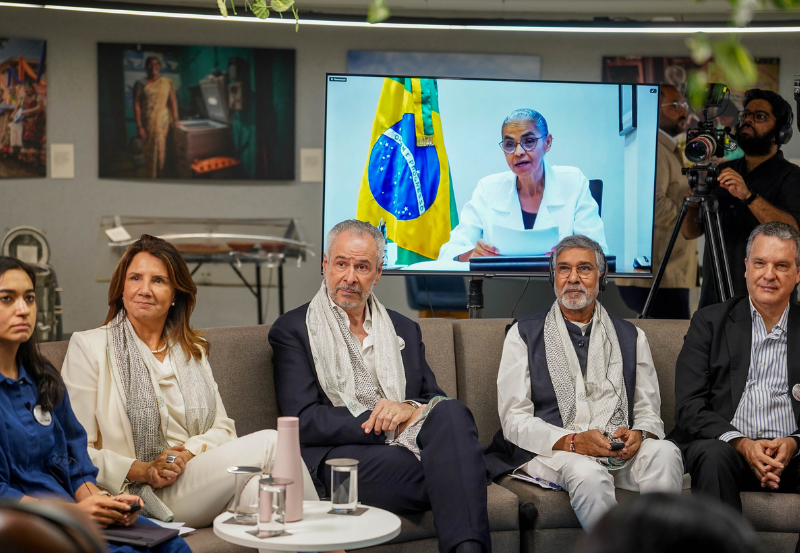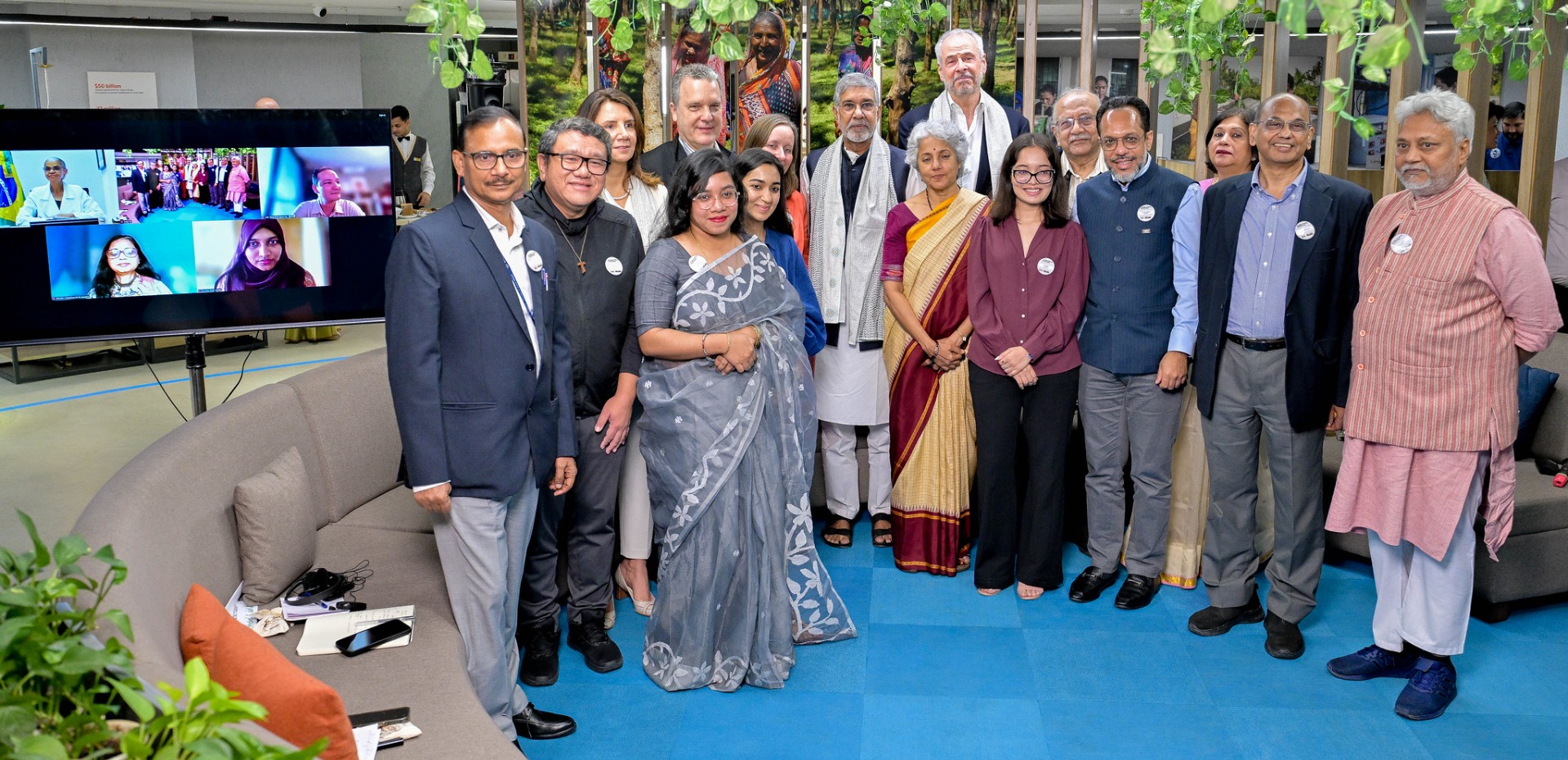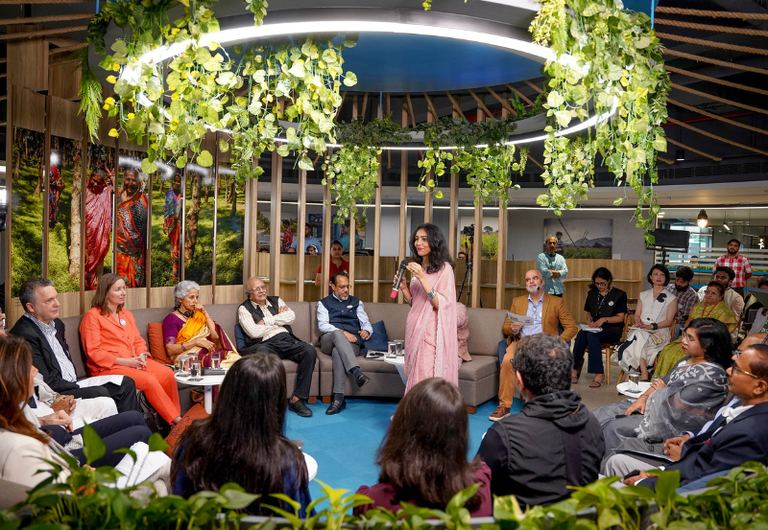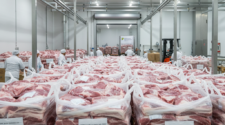This Monday, September 1st, the Indian capital hosted the third Regional Dialogue of the Global Ethical Stocktake (GES), a core pillar of the social mobilization process leading up to COP30, the United Nations Climate Change Conference to be held in Belém.
The event gathered 22 participants, including climate activists, artists, scientists, civil society representatives, and public authorities who engaged in a collective reflection on how humanity must ethically advance the fight against climate change. Discussions focused on aligning efforts with climate science and the Paris Agreement’s goal of limiting global temperature rise to 1.5°C above pre-industrial levels.
Through this Dialogue, participants reaffirmed their commitment to the global movement called by the COP30 Presidency, which is aimed at the effective implementation of climate agreements established over the past decade. These agreements seek to counteract the increasing impacts of the climate crisis, which disproportionately affect the world’s most vulnerable communities.
Among the high-level participants were Brazil’s Minister of the Environment and Climate Change, Marina Silva (joining remotely); Nobel Peace Prize Laureate and Asian Co-leader of the Global Ethical Stocktake, Kailash Satyarthi; COP30 President Ambassador André Corrêa do Lago; COP30 CEO Ana Toni; and Brazilian Ambassador to India and Bhutan, Kenneth Nóbrega.
“The Global Ethical Stocktake seeks to assess the current state of the climate emergency through the lens of an ethics of values, as a way to counterbalance the ethics of circumstances that have contributed to the worsening of the crises we are facing,” emphasized Minister Marina Silva. She mentioned that, due to the climate crisis, around 500,000 lives are lost yearly to heatwaves.

- Participants included the Minister of the Environment and Climate Change, Marina Silva (remotely); the CEO of the conference, Ana Toni; the president of COP30, Ambassador André Corrêa do Lago; Nobel Peace Prize winner and co-leader of the Global Ethical Stocktake for Asia, Kailash Satyarthi; and the Brazilian ambassador to India and Bhutan, Kenneth Nóbrega – Photo: Fernando Donasci/MMA
“Complacency is a death wish. Our planet is on fire, and the time for business as usual is over. We must act now—fundamentally changing our way of life, redefining growth, stopping climate injustice, and uniting in a new era of global cooperation. Let’s globalise compassion to protect our home,” said Kailash Satyarthi, founder of the Satyarthi Movement for Global Compassion.
The Global Ethical Stocktake (GES) invites humanity to consider how far we have come, what actions still need to be taken, and what collective behavioral and societal shifts are required to meet the 1.5°C target. It draws inspiration from the Global Stocktake under the Paris Agreement, concluded at COP28 in the United Arab Emirates.
While the technological solutions to address the climate crisis already exist, the GES emphasizes that the missing piece is ethical commitment. The Dialogues aim to pave the way for the climate agreements signed by nearly 200 countries since 2015’s full implementation.
The core focus is the UAE Consensus, adopted at COP28, where countries agreed to triple renewable energy capacity, double energy efficiency, end deforestation, and transition away from fossil fuels.
“It’s up to us to transform this agenda into action, and commitments into tangible results for all regions. The biggest challenge is no longer discussing what needs to be done, but having the moral and ethical courage to do it,” explained Marina Silva.

- Participants strengthened the global task force convened by the COP30 Presidency for the implementation of climate agreements signed over the last decade – Photo: Fernando Donasci/MMA
Led by Brazilian President Luiz Inácio Lula da Silva and UN Secretary-General António Guterres, the GES will produce six regional reports and a synthesis report to be presented at the Pre-COP in Brasília this October. These documents will be submitted to the COP30 Presidency to help inform decision-making processes and guide Heads of State and climate negotiators.
André Corrêa do Lago highlighted that the GES presents the COP30 Presidency with issues from multiple sectors of global society that must be taken into account, in addition to the concerns raised by individual countries. “In international negotiations, it’s only countries that speak. But, at the end of the day, it’s about people”, he mentioned.
Ana Toni stated that the Global Ethical Stocktake is supposed to be a guideline for COP30: “In these roundtables, we bring the moral compass we need to face at COP30.” The conference CEO noted that “time is our greatest enemy” in tackling climate change. “Every day that we do not act, so many more people suffer, be it in Brazil, India, or the US. Time is a precious resource that we sometimes take for granted”, she said.
Regional Dialogues
The GES is being carried out through a series of Regional Dialogues, which take place across different continents through October 2025. The first dialogue was held in London (Europe), followed by Bogotá (South, Central America and the Caribbean), co-led by former Presidents Mary Robinson (Ireland) and Michelle Bachelet (Chile), respectively.
Upcoming dialogues will take place in Africa, co-led by Kenyan climate activist Wanjira Mathai; Oceania, co-led by former President of Kiribati, Anote Tong; and North America, co-led by Karenna Gore, U.S. activist and founder of the Center for Earth Ethics.
In addition to these high-level meetings, Self-Organized Dialogues are being encouraged across the globe, led by civil society and national/subnational governments, following the same methodology and principles.
The meeting in New Delhi took place at the Council on Energy, Environment and Water (CEEW) headquarters, and was organized with the support of the Federal Ministry for the Environment, Nature Conservation and Nuclear Safety of Germany.
Full List of Participants – Asia Dialogue of the Global Ethical Stocktake (GES):
- Ajay Mathur – Energy and climate expert; Professor of Practice at the Indian Institute of Technology, Delhi
- Ana Toni – CEO, COP30
- André Corrêa do Lago – President, COP30
- Arunabha Ghosh – Public policy expert, author, founding CEO of the Council on Energy, Environment and Water (CEEW) and Special Envoy for COP30 representing South Asia
- Farzana Faruk Jhumu – Climate activist from Bangladesh and environmental justice advocate
- Ihitashri Shandilya – Founder and CEO of MITHILAsmita, a UN-recognized initiative promoting Madhubani traditional art
- Kailash Satyarthi – Nobel Peace Laureate; founder of the Satyarthi Movement for Global Compassion (SMGC); Asia Co-lead for the GES
- Kenneth Nóbrega – Brazilian Ambassador to India and Bhutan
- LeoHorn‑Phathanothai – Author, strategist, ecosystem builder and advocate for green transitions in Southeast Asia
- Manjyot Kaur – International climate policy specialist
- Marina Silva – Minister of the Environment and Climate Change of Brazil
- Nik Nazmi – Vice President of Keadilan and Member of Parliament, Malaysia (Setiawangsa)
- Nitin Desai – Economist, London School of Economics alumnus; former UN Under-Secretary-General for Economic and Social Affairs (1992–2003)
- Philipp Ackerman – German Ambassador to India
- Rajendra Singh – Environmentalist; leader of a community water management movement in Rajasthan
- Ravi Shankar – Indian lawyer and political leader; Member of Lok Sabha since 2019
- Ridhima Pandey – Indian climate activist recognized internationally since age nine
- Rodne Galicha – Environmental and climate leader from the Philippines
- Seruni Salsabila – Southeast Asian youth environmental leader and climate entrepreneur
- Soumya Swaminathan – Indian pediatrician and clinical scientist; global health leader with a climate focus
- Sumaiya Binte Selim – Senior researcher in climate and development, Banglades
- Vibha Dhawan – Director-General of The Energy and Resources Institute (TERI) since 2021
MMA Special Media Relations Office
imprensa@mma.gov.br
(61) 2028-1227/1051
Visit the MMA Flickr page
Fonte: gov.br








